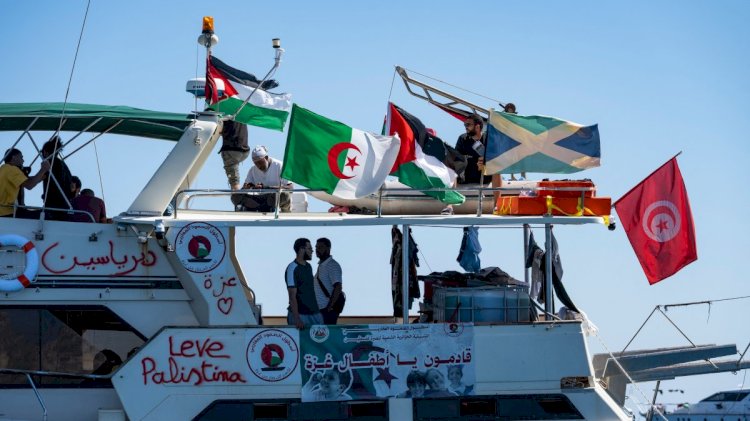Tensions Spike in Mediterranean as Sumud Flotilla Enters 'High-Risk Zone' Amid Trump's Gaza Peace Push
GAZA WATERS— The massive civilian-led Global Sumud Flotilla, carrying hundreds of international activists and urgent humanitarian aid, has entered a 'high-risk zone' off the coast of Gaza, dramatically raising tensions as the international community simultaneously scrambles to secure a response to US President Donald Trump's new peace proposal.
Organizers for the flotilla, which includes over 50 vessels, reported a significant increase in drone surveillance and close approaches by unidentified ships as they passed the 150-nautical-mile mark, the area where previous aid missions were intercepted by Israeli forces. Onboard reports indicated vessels were on "high alert" after an alleged attempt to jam communications and disable a lead ship.
The timing of the flotilla's final push to break the years-long naval blockade coincides with a tight deadline set by President Trump for Hamas to accept his administration's 20-point proposal to end the war, warning of a "very sad end" if the plan is rejected. This juxtaposition has created a complex diplomatic and security dynamic.
The Flotilla and the Peace Plan
Italian Prime Minister Giorgia Meloni was among the European leaders urging the flotilla to abandon its final leg, arguing that the attempt to breach the blockade "risks becoming a pretext to destroy the Trump peace plan." The flotilla, however, forcefully rejected the proposal to divert to a Cyprus port, stating that the humanitarian demand to break the siege "cannot be walked back to port."
Israel, which has accepted the US proposal, has vowed to block the flotilla from reaching the coast, labeling the mission a "provocation and serving Hamas." The Israeli Foreign Ministry went so far as to claim that documents recovered in Gaza proved the flotilla had "direct involvement" with the Palestinian group.
Varied Arab and Hamas Responses
The Trump administration's plan, which outlines a pathway to an immediate ceasefire, hostage release, and the disarmament of Hamas in exchange for a massive rebuilding effort and potential future statehood, has been met with a surprisingly open reception from the wider region, while Hamas remains cautious.
Foreign Ministers from a joint group of eight nations, including Saudi Arabia, Qatar, and Turkey, issued a statement welcoming President Trump's "sincere efforts" and expressing confidence in his ability to find a path to peace. While pressing for an agreement that ensures a full Israeli withdrawal and a path to a two-state solution, the statement signals a regional appetite to leverage the proposal to end the ongoing conflict.
The Palestinian group has not immediately rejected the proposal, which calls for its complete disarmament and non-involvement in the post-war governance of Gaza. Mediators, including Egypt and Qatar, conveyed the plan to Hamas leadership, who stated they would study the proposal "responsibly" alongside other Palestinian factions. However, sources close to the group indicated they see the plan as "entirely biased toward Israel" and imposing "impossible conditions."
With the Global Sumud Flotilla risking a dramatic interception at sea and a critical US deadline for a political resolution rapidly approaching, the coming hours are expected to be pivotal for the future of the besieged enclave.
Disclaimer
The views expressed in this article are the author’s own and do not necessarily mirror Islamonweb’s editorial stance.
























Leave A Comment